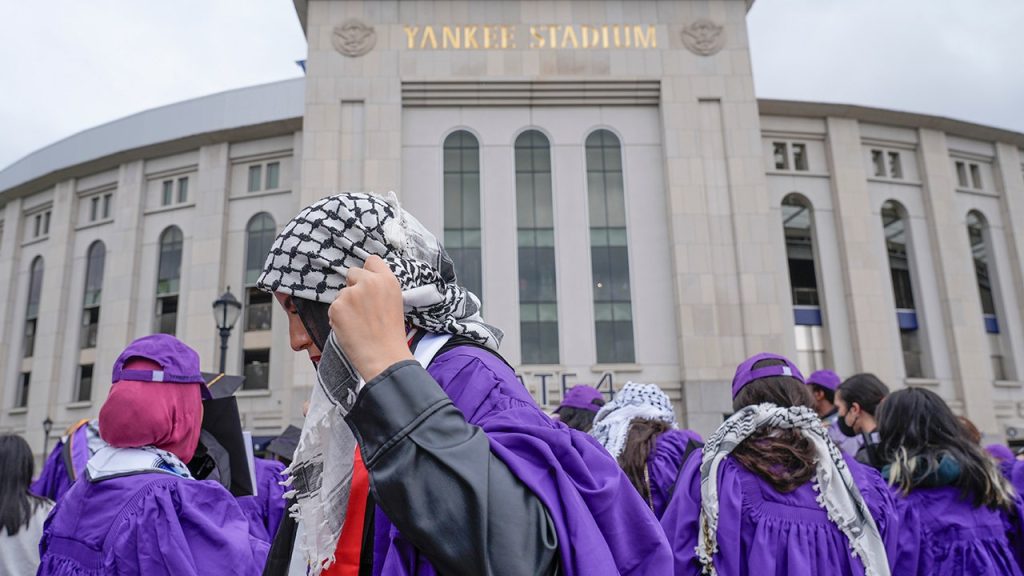A group of New York University students protested during their commencement ceremony at Yankee Stadium in the Bronx, demanding that the university divest from Israel. The protestors, dressed in graduation gowns, chanted “We will free Palestine,” with some students having their hands painted red and others holding the Palestinian flag. The group walked out of the ceremony while it was ongoing, calling for university leaders to sever ties with Israel.
The NYU Faculty and Staff for Justice in Palestine referred to the commencement as a “distraction” in a social media post, criticizing the university’s ties to Israel. This demonstration is part of a larger trend of student protests disrupting commencement ceremonies at universities across the United States. At Columbia University’s School of Social Work, a student marched across the stage wearing zip-tie handcuffs and tore up her diploma in defiance. Columbia had recently announced the cancellation of its university-wide commencement due to security concerns related to anti-Israel protests.
The protests were not limited to New York City, as similar demonstrations occurred at Duke University in North Carolina where a group of students carrying the Palestinian flag chanted “free Palestine” during comedian Jerry Seinfeld’s commencement address. Seinfeld’s speech was overshadowed by the cheers of supporters drowning out the protesters, with the crowd chanting his name in response. These protests highlight the growing tension on college campuses regarding the Israeli-Palestinian conflict, with students using their graduation ceremonies as a platform to voice their dissent.
These protests come amid ongoing debates about divestment from Israel and the broader issue of Palestinian rights. Universities across the country are facing pressure from student activists to sever ties with companies and organizations supporting Israel, amidst growing awareness and advocacy around the Israeli occupation of Palestinian territories. The protests during commencement ceremonies serve as a visible expression of this movement, drawing attention to the plight of the Palestinian people and challenging institutions to take a stand on the issue.
The actions of these students reflect the broader activism and advocacy efforts on college campuses around social justice issues. As graduates, these students are using their commencement ceremonies as a platform to raise awareness about the Israeli-Palestinian conflict and pressure their universities to take action. The disruptions at these ceremonies have sparked debate and discussion about the role of universities in promoting social justice and addressing global human rights abuses, with some applauding the students for their courage and others criticizing their methods.
In response to the protests, university administrators are facing difficult decisions about how to navigate the tensions and demands of their student body. The cancellations of commencement ceremonies and the disruptions by protestors have forced university leaders to confront these issues head-on, raising questions about academic freedom, free speech, and institutional relationships. As the debate over divestment from Israel and support for Palestinian rights continues to unfold on college campuses, these demonstrations serve as a stark reminder of the power of student activism and the importance of engaging in dialogue and debate on complex and controversial issues.


